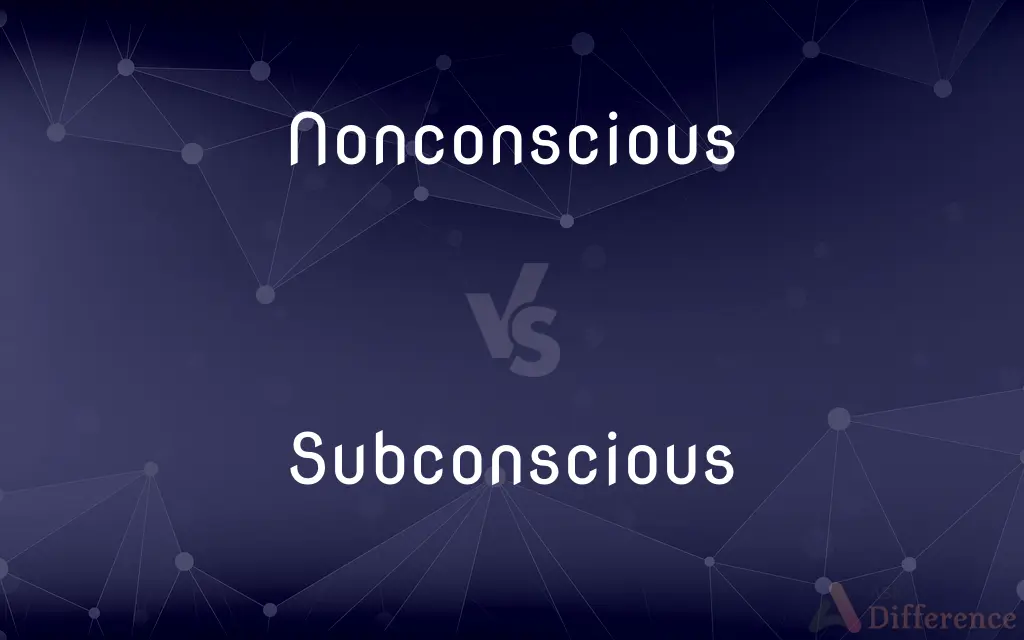Nonconscious vs. Subconscious — What's the Difference?
By Urooj Arif & Fiza Rafique — Updated on May 8, 2024
"Nonconscious" refers to processes not accessible to the conscious mind, such as bodily functions, while "subconscious" pertains to mental activities below the level of conscious awareness but can influence thoughts and behaviors.

Difference Between Nonconscious and Subconscious
Table of Contents
ADVERTISEMENT
Key Differences
"Nonconscious" processes are those that operate without any awareness, such as heart rate or digestion. On the other hand, "subconscious" involves mental processes that are not currently in focal awareness but can be recalled with some effort or trigger.
The nonconscious governs automatic functions that sustain life and require no deliberate thought, such as breathing and reflex responses. Whereas, the subconscious is often discussed in psychology as a storage area for feelings and memories that are not being actively thought about but still affect an individual’s behavior and emotional responses.
In cognitive science, "nonconscious" mechanisms are studied for their role in the brain’s underlying operations that do not require active cognition, like perception and movement. On the other hand, the "subconscious" is explored for its role in influencing decision-making and creativity through less apparent mental processes.
From a therapeutic perspective, interventions may not directly target nonconscious processes since they are automatic and not typically modifiable through cognitive behavioral techniques. Conversely, the subconscious can be accessed through techniques like hypnosis or psychoanalysis to address deeper psychological issues.
In everyday language, "nonconscious" is less commonly used and is typically associated with physiological functions. Whereas "subconscious" is more frequently referenced in contexts of psychology and self-help, often in discussions about influencing or changing underlying personal narratives or beliefs.
ADVERTISEMENT
Comparison Chart
Definition
Refers to automatic bodily functions and processes beyond conscious awareness
Involves mental processes below conscious awareness that influence thoughts and behaviors
Accessibility
Not accessible to introspection or direct cognitive engagement
Can be accessed indirectly through therapy or reflection
Psychological Relevance
Primarily physiological and basic cognitive operations
Associated with emotions, memories, and suppressed thoughts
Examples
Heart rate, digestion, immune response
Dreams, implicit biases, suppressed memories
Common Usage in Language
Less commonly used, more scientific
More commonly used, especially in psychology and self-help
Compare with Definitions
Nonconscious
Relating to cognitive processes that occur without conscious perception.
Nonconscious perception influences our decisions without us realizing.
Subconscious
A mental realm that interacts with but remains separate from conscious reasoning.
The subconscious mind plays a key role in shaping our perceptions.
Nonconscious
Automatic responses that the body performs.
Blinking is a nonconscious action that protects the eyes.
Subconscious
The layer of consciousness that stores suppressed feelings and thoughts.
Therapy can help bring subconscious conflicts to the surface.
Nonconscious
Pertaining to bodily functions not controlled by conscious thought.
The nonconscious regulation of the heartbeat continues while we sleep.
Subconscious
Psychological undercurrents that influence dreams and instincts.
Dreams often express subconscious desires or fears.
Nonconscious
Basic cognitive functions that do not require awareness.
Nonconscious processing of stimuli happens instantly.
Subconscious
Mental activities below the level of conscious thought that affect behavior.
Subconscious biases can affect our judgments and actions.
Nonconscious
Operations of the mind that are not introspectively accessible.
Nonconscious learning can occur through exposure to new information.
Subconscious
The part of the mind not currently in focal awareness but can influence thoughts.
His fear of water was rooted in a subconscious memory.
Nonconscious
Not conscious
Subconscious
In psychology, the subconscious is the part of the mind that is not currently in focal awareness.
Nonconscious
Concerning mental functioning that is not represented in consciousness;
Nonconscious psychic processes
Subconscious
Of or concerning the part of the mind of which one is not fully aware but which influences one's actions and feelings
My subconscious fear
Nonconscious
Relating to the lack of consciousness of inanimate things
Subconscious
The subconscious part of the mind (not in technical use in psychoanalysis, where unconscious is preferred)
Uncertainties were lurking around the edge of her subconscious
Subconscious
Not wholly conscious; partially or imperfectly conscious
Subconscious perceptions.
Subconscious
The part of the mind below the level of conscious perception. Often used with the.
Subconscious
Partially conscious.
Subconscious
Syn of unconscious.
The sense of smell can be a subconscious influence on our actions.
Subconscious
Syn of unconscious.
A person can sometimes wake up knowing the solution to a problem that their subconscious has been working on.
Subconscious
Occurring without the possibility or the fact of an attendant consciousness; - said of states of the soul.
Subconscious
Partially conscious; feebly conscious.
Subconscious
Psychic activity just below the level of awareness
Subconscious
Just below the level of consciousness
Common Curiosities
Is it possible to become aware of nonconscious processes?
While nonconscious processes themselves operate outside of awareness, their effects can sometimes be observed indirectly through behaviors or physiological changes.
How does the subconscious influence our emotions?
The subconscious influences our emotions by storing past experiences, emotions, and memories that can trigger emotional responses without our immediate awareness.
Can nonconscious processes be studied scientifically?
Yes, nonconscious processes can be studied scientifically through methods like brain imaging and physiological monitoring to observe functions that operate without conscious control.
What role does the subconscious play in psychotherapy?
In psychotherapy, the subconscious is often targeted to uncover and resolve repressed memories and emotions, which are believed to influence current behavior and mental health.
What types of processes are considered nonconscious?
Nonconscious processes include physiological functions like breathing, digestion, and reflexive actions, as well as automatic cognitive operations that do not involve conscious thought.
Are subconscious thoughts always hidden?
Subconscious thoughts are not always actively hidden but exist below the level of conscious awareness, influencing behavior and thoughts indirectly.
What techniques are used to access the subconscious?
Techniques such as hypnotherapy, psychoanalytic therapy, and certain types of meditation are used to access the subconscious and bring to light underlying psychological issues.
Can dreams reveal our subconscious thoughts?
Dreams are often considered expressions of the subconscious, revealing desires, fears, and unresolved conflicts through symbolic imagery and narratives.
What is the difference between subconscious and unconscious?
The term "subconscious" refers to mental processes below conscious awareness that influence thoughts and behaviors, while "unconscious" can denote deeper mental processes that are more difficult to access and are often completely repressed.
How can one influence their subconscious?
Influencing the subconscious can be achieved through practices like affirmations, mindful meditation, and therapy, which help reshape subconscious beliefs and reactions.
What impact does the subconscious have on personal relationships?
The subconscious can impact personal relationships by affecting how individuals react to others, often based on past experiences or deep-seated emotional patterns.
How do nonconscious processes affect decision-making?
Nonconscious processes affect decision-making by rapidly processing information and influencing responses without conscious deliberation, often based on learned patterns and environmental cues.
Can altering nonconscious processes improve health?
While nonconscious processes are largely automatic, interventions like biofeedback can help individuals gain some level of control over these processes, potentially improving health outcomes.
How does the nonconscious interact with the conscious mind?
The nonconscious interacts with the conscious mind by automatically handling tasks that do not require conscious attention, allowing the conscious mind to focus on more complex activities.
How do nonconscious and subconscious processes differ in learning?
Nonconscious learning occurs automatically and without awareness, such as learning to react to stimuli, while subconscious learning involves absorbing information that can later influence behavior and thoughts, often without direct awareness of the learning process.
Share Your Discovery

Previous Comparison
Stability vs. Strength
Next Comparison
Marlinspike vs. FidAuthor Spotlight
Written by
Urooj ArifUrooj is a skilled content writer at Ask Difference, known for her exceptional ability to simplify complex topics into engaging and informative content. With a passion for research and a flair for clear, concise writing, she consistently delivers articles that resonate with our diverse audience.
Co-written by
Fiza RafiqueFiza Rafique is a skilled content writer at AskDifference.com, where she meticulously refines and enhances written pieces. Drawing from her vast editorial expertise, Fiza ensures clarity, accuracy, and precision in every article. Passionate about language, she continually seeks to elevate the quality of content for readers worldwide.













































